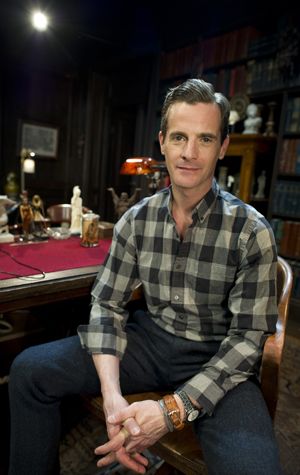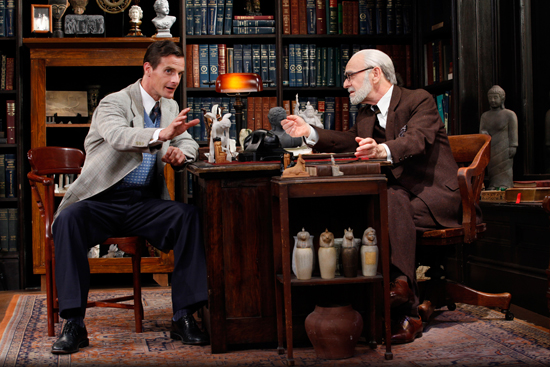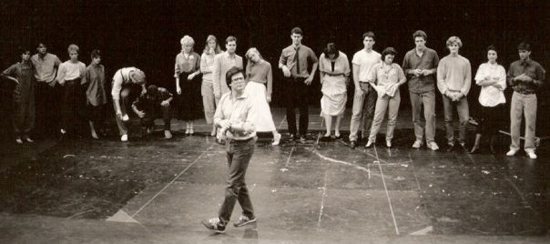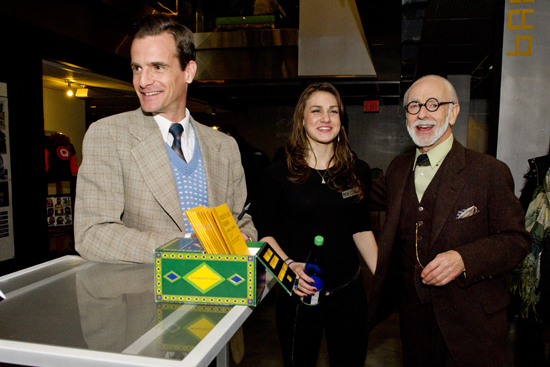Fencing with Freud
Alum plays C. S. Lewis in smash Off-Broadway production

Over the lazy, hazy, crazy days of summer, BU Today looks back at some of our favorite stories from the academic year. Each week we present stories about a special topic, from student clubs and sports to research and religion. This week we feature the best in theatre.
Mark H. Dold still shakes his head at the surprising twists that keep him playing the role of C. S. Lewis in the Off-Broadway play Freud’s Last Session. Dold got what he calls a “9-1-1 phone call” from the director of the Barrington Stage Company in summer 2009, asking him to read the part after another actor (and good friend) had become ill. He didn’t know anyone in the production crew, but he showed up the next day and was told he got the job.
The play was pitched to Dold (CFA’86) and costar Martin Rayner, who plays Sigmund Freud, as a quick hit—14 runs and done. Then it sold out, then it was extended to a third week in Pittsfield, and then in July 2010, a team of producers brought it to the Marjorie S. Deane Little Theater at Manhattan’s West End YMCA. In October 2011, the play moved to the New World Stages. It is now nearing its 700th performance.
On March 16, Dold and Rayner will take Freud’s Last Session to Chicago (a separate cast will continue on in New York City until their return), while a handful of offshoots will spring up in cities from Los Angeles and Pittsburgh to Tokyo and Rio de Janeiro over the next year.
“This whole experience is such a cosmic mistake in a way to me,” says Dold, sitting cross-legged on the stage and sipping tea after a recent matinee. He smiles in bewilderment, searching for someone to thank—God, the universe, fill-in-the-blank—but comes up short. Strange, considering that Dold—as Lewis—was defending God’s existence to Freud only minutes before on the same stage. Freud’s Last Session is based on The Question of God: C. S. Lewis and Sigmund Freud Debate God, Love, Sex, and the Meaning of Life, a book by Armand M. Nicholi, Jr., that toys with the idea that the Oxford professor who visited Freud on September 3, 1939—two weeks before the psychoanalyst’s assisted suicide and the day England entered World War II—was Lewis. No one knows if this is true, but after watching the play, it’s nearly impossible to think otherwise.

The two characters meet when 83-year-old atheist Freud is struggling with complications of oral cancer. Converted Christian Lewis is a 41-year-old World War I veteran and professor, who had yet to write The Chronicles of Narnia and The Screwtape Letters.
As theatrical hits go, the one-act play is spartan. No big-name stars grace the stage. Set design is minimal (Freud’s study in Hampstead, England). And the play has no special effects, beyond the mental acrobatics that each character performs as the two debate a host of topics, from religion and the existence of God to sex and father-son relationships. Yet the heady conversation continues to draw crowds, and awards: Freud’s Last Session received the 2011 Off-Broadway Alliance Award for best new play.
As Lewis, Dold is the embodiment of optimism, shining beside a crotchety Freud. The two characters grow to respect each other’s minds even though they disagree on core principles. At the end of the “session,” neither has won an argument, but each has left a lasting impression on the other.
The prospect of playing Lewis conjured up what Dold calls every actor’s nightmare. “I was so intimidated by playing someone who was so intellectually superior to me,” he says. To prepare for the role, he read everything discussed in the play—Freud’s books, the New Testament, and everything written by or about Lewis from his birth until the day the two met. And not a day later. All other publications past that point were irrelevant to the actor.
“Who am I going to be 10 years from now?” Dold says. “I have absolutely no idea. I don’t even know who I’m going to be when I walk out this door. So my research should stop now, today, September 3, 1939. This is all he has. This is all he knows.”
A worker bee

When Dold was a kid growing up north of Chicago 30 years ago, all he knew was that he wanted to be an actor. Coming to the College of Fine Arts theater program was like a dream come true. “It was the first time that I actually got to say to myself or say to people, ‘Hey, I’m Mark. I’m an actor,’” he says. “I was officially on the road to doing this full-time, professionally, for real.”
He remembers living in Claflin Hall, hanging out in Kenmore Square late into the night eating pita and hummus, and go-go dancing for extra cash at a Lansdowne Street club called Spit. He spent most days at the Huntington Theatre Company.
“I knew I was in the right place because there was an actress who played Laura in The Glass Menagerie who was out of this world,” Dold recalls, breaking into a brilliant grin. “It was a stupendous performance. And it ends up being Julianne Moore.” A freshman while Moore (CFA’83) was a senior, Dold remembers thinking: “Who is this girl? And if I can learn even a quarter of what she’s learned in the four years she’s been here, I might end up being pretty good at this.”
By graduation, Dold was one of 16 weeded down from his entering class of 75. He traveled to New York City with other BU actors for a League of Professional Theatre Training Programs audition at the Juilliard School before a panel of agents, casting directors, and other industry professionals. “It was a nightmare, frankly,” he recalls.
At first, he says, work was nonexistent. Then it was slow. He learned what it’s like to be unemployed, to not have an agent, to get free eyeglasses or a new pair of shoes through local charities. He also learned that he really loved to work.
“I’m one of those guys that has to work,” says Dold, who sees parallels to his physician father. “If I don’t, I instantly feel disconnected from me.” So he honed his skills by earning a master’s degree at the Yale School of Drama and two weeks before graduation got a role in a Shakespeare in the Park production.
“If you’re going to be blessed to work at all, you’re going to be a worker bee,” Dold says. “That’s what I have to call myself: a worker bee. It’s not modesty, it’s the truth.”

Since then, Dold has acted in Broadway (Absurd Person Singular) and Off-Broadway productions (Shockheaded Peter, The Winter’s Tale, Othello, among others), in TV series (Law & Order, Gossip Girl, Charlie’s Party), and in film. Freud’s Last Session is the longest running play he’s starred in, and the first he’ll take on the road.
In the hallway after their matinee performance, Dold and Rayner—still in costume—chat with audience members and sign playbills. “Tell your friends about the play, please,” Dold says as he scribbles his signature for an admirer.
People often ask Dold if he tires of playing the same character. “Are you crazy?” he tells them. “I’ve never been more relaxed on a stage in my life.” The long run has allowed him unparalleled focus on Lewis. There are still moments, he says, when a line strikes him with a more profound meaning, or he realizes that a certain action would be more appropriate in a specific scene.
Dold is aware that theatergoers wonder about his belief in God. (It happens that he is not an atheist, and Rayner is—not prerequisites, Dold says, for the roles.) He simply replies: “I’m an actor. You didn’t know me before this moment in time. We may never see each other again. What’s important is what I left you with, not what I think or feel.”
This story was originally published on March 2, 2012.
Comments & Discussion
Boston University moderates comments to facilitate an informed, substantive, civil conversation. Abusive, profane, self-promotional, misleading, incoherent or off-topic comments will be rejected. Moderators are staffed during regular business hours (EST) and can only accept comments written in English. Statistics or facts must include a citation or a link to the citation.